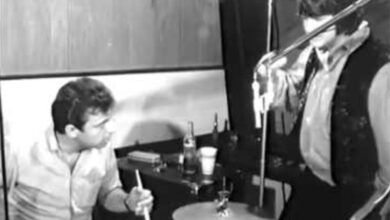Elvis Presley’s ‘Soldier Boy’: A Heartfelt Tribute to Love and Sacrifice
“Soldier Boy” by Elvis Presley stands out as a unique track within his extensive discography, recorded in 1960 for his album Elvis Is Back!, shortly after his return from military service. The song features a doo-wop style, diverging from the rock and roll sound Presley is often associated with, highlighting his ability to blend different strands of American music. This track captures his post-military experiences and showcases his versatility as an artist, reflecting themes of love and the emotional journey of those in service.
The lyrics of “Soldier Boy” poignantly address the deep emotional sacrifices made by soldiers and their loved ones, making it a touching tribute to those who serve. Its gentle melody, sincere words, and heartfelt vocal delivery from Presley allow listeners to feel the vulnerability and longing within the song, which distinguishes it as a timeless piece in his musical legacy. The ballad’s portrayal of the struggles of separation and hope for reunion resonates deeply with listeners, illustrating the softer side of Elvis’s musical talents.
Presley’s career was marked by a dynamic range that extended beyond just rock and roll hits. “Soldier Boy” stands as a reminder of his capacity to deliver emotionally charged, tender performances that complement his more energetic tracks, revealing the multifaceted nature of his artistry. Throughout his life, Elvis Presley left an indelible mark on the music world, and his legacy as the “King of Rock and Roll” remains influential to this day.
Recorded during a pivotal moment in Elvis’s career, Elvis Is Back! marked his return to the music scene after serving in the U.S. Army from 1958 to 1960. The album itself was a critical and commercial success, symbolizing his ability to reinvent himself and adapt to changing musical landscapes. “Soldier Boy” contributed to the album’s diverse sound, which included rockabilly, blues, and country influences, further demonstrating Presley’s versatility.
The doo-wop style of “Soldier Boy” is characterized by its smooth harmonies and melodic structure, a departure from the more aggressive rock and roll tunes that Elvis was renowned for. This stylistic choice not only showcased his ability to navigate different genres but also broadened his appeal to a wider audience. The song’s arrangement, featuring lush backing vocals and a steady rhythm, provided a perfect backdrop for Elvis’s expressive vocal performance.
Elvis’s vocal delivery in “Soldier Boy” is particularly noteworthy for its emotional depth. His ability to convey vulnerability and sincerity through his voice adds a layer of authenticity to the song, making it resonate on a personal level with listeners. This emotional connection is a testament to his skill as a performer, capable of evoking a wide range of feelings through his music.
Thematically, “Soldier Boy” taps into universal emotions associated with love, loss, and hope. The song’s narrative of waiting and longing for a loved one’s return speaks to the experiences of many who have faced similar circumstances, whether in military service or other forms of separation. This relatability enhances the song’s enduring appeal, allowing it to remain relevant across different generations.
In addition to its musical qualities, “Soldier Boy” holds historical significance as part of Elvis’s post-army reintegration into the entertainment industry. During his military service, Elvis took a hiatus from his burgeoning music career, a period that allowed him to mature both personally and artistically. The release of Elvis Is Back! and tracks like “Soldier Boy” signified his successful return and ability to maintain his status as a leading figure in music.
Elvis’s ability to blend different musical styles is evident in “Soldier Boy,” reflecting the broader trends in American music during the late 1950s and early 1960s. The integration of doo-wop elements into his repertoire highlights the fluidity of genre boundaries and Presley’s role in bridging various musical traditions. This blending not only enriched his music but also contributed to the evolution of contemporary music by fostering cross-genre experimentation.
The reception of “Soldier Boy” was positive, with fans appreciating the song’s heartfelt message and Elvis’s sincere performance. While it may not have achieved the same level of commercial success as some of his rock and roll hits, the song has maintained a lasting presence in his catalog, often cited by fans as a favorite for its emotional resonance and musical craftsmanship. Its enduring popularity underscores the timeless quality of Elvis’s work and his ability to create music that transcends fleeting trends.
Beyond its immediate impact, “Soldier Boy” has influenced other artists who admire Elvis’s versatility and emotional expressiveness. Musicians across various genres have drawn inspiration from his ability to convey deep emotion through song, leading to covers and reinterpretations that pay homage to his legacy. This ongoing influence is a testament to the song’s quality and Elvis’s enduring impact on the music industry.
Elvis Presley’s broader legacy, as exemplified by songs like “Soldier Boy,” continues to inspire new generations of artists and music lovers. His pioneering spirit, willingness to experiment with different genres, and ability to connect emotionally with his audience have cemented his place in music history. “Soldier Boy” serves as a poignant reminder of his multifaceted talents and his capacity to blend heartfelt emotion with musical innovation.
In conclusion, “Soldier Boy” is a significant track in Elvis Presley’s discography, showcasing his ability to transcend genre boundaries and deliver emotionally impactful performances. Recorded during a pivotal time in his career, the song highlights his versatility and deep connection to his audience. Through its heartfelt lyrics and gentle melody, “Soldier Boy” stands as a testament to Elvis’s enduring legacy as a versatile and emotionally resonant artist, continuing to resonate with listeners long after its initial release.





